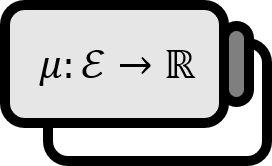Almost Uniform Convergence in Measure Theory
Definition 1
Let a measure space $( X , \mathcal{E} , \mu)$ be given.
- A sequence $\left\{ f_{n} : X \to \mathbb{R} \right\}_{n \in \mathbb{N}}$ of measurable functions is said to converge almost uniformly to a measurable function $f : X \to \mathbb{R}$ if, for each $\delta > 0$, there exists $E_{\delta} \in \mathcal{E}$ satisfying $\mu \left( E_{\delta} \right) < \delta$ such that on $X \setminus E_{\delta}$ $f_{n}$ converges uniformly to $f$. In this case $f_{n}$ is said to be almost uniformly convergent to $f$.
- If for every $\delta > 0$ there exists $E_{\delta} \in \mathcal{E}$ satisfying $\mu \left( E_{\delta} \right) < \delta$ such that $\left\{ f_{n} : X \to \mathbb{R} \right\}_{n \in \mathbb{N}}$ is uniformly Cauchy on $X \setminus E_{\delta}$, then $f_{n}$ is called an almost uniformly Cauchy sequence.
See also
- Almost uniform convergence $\implies$ convergence in measure
Bartle. (1995). The Elements of Integration and Lebesgue Measure: p69. ↩︎
